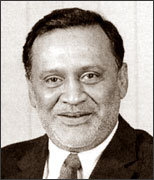Corporate News
Ceylinco insurance non-voting share issue to raise Rs. 1.5 b
Ceylinco Insurance Plc will launch its non voting share issue to
raise Rs. 1.5 bln.
|

Ajith Gunawardena |
The non-voting share issue will open on June 20 and the company will
issue 8.5 million non voting shares at Rs. 175 per share, said Chief
Executive Director (General) Ceylinco Insurance Plc Ajith Gunawardena.
He said that monies raised from the issue will be used for further
expansion into the region, establish medical centres and strengthen the
local presence.
At present we operate in 11 countries including Bangladesh, Nepal,
Maldives, Dubai, Oman, Qatar, Kuwait, Saudi Arabia and Phillipines while
we are planning to venture into Thailand, Vietnam and Indonesia in the
near future.
Gunawardena said that the company has already set up five medical
centres and any adult who obtains a policy by paying Rs. 500 or a child
who pays Rs. 250 can visit the medical centre and get OPD treatment
which includes checking of pressure and blood sugar, dressing of wounds
and burns as well as treating of common ailments. Any number of visits
per year is permitted.
He said the reason to introduce the spot for motor as well as
non-motor was because people required speed. Today speed is the name of
the game. Therefore, we adopted that to our business to serve our
customers with speed.
These innovative steps helped us to increase the profitability of the
company to over Rs. one billion. The gross written premium for both life
and general stood at Rs. 17.2 bln in 2007.
The company is also planning to create new channels of distribution
as we want to take insurance to the doorstep of the customer.
Gunawardena said that voting shares of Ceylinco Insurance are trading
at the bourse between Rs. 200-225 which is claimed to be the highest in
the financial sector.
He said that they have won many awards including innovation.
Speaking of their CSR initiatives, he said that every person who dies
due to a bomb blast is given Rs. 50,000 while the Sathkara Fund assists
policyholder families in health, education and extracurricular
activities.
The Ceylon Insurance Company was the first Sri Lankan company
registered under the Companies Ordinance of 1938.
The company commenced operations in April 1939. In 1962 all life
insurance business was taken over by the Insurance Corporation of Sri
Lanka which was owned by the government and in 1964 the general
insurance business too was taken over by the government.
In 1988 the government liberalised the insurance sector and permitted
private insurance companies to enter the market again.
The managers to the issue is SMB Kenanga Investment Corporation Ltd,
while the bankers to the issue is Seylan Bank Plc.
SG
JKH Group profit after tax up 45% to Rs. 5.12b for 2007/08
|

Susantha Ratnayaka
|
The John Keells Holdings (JKH) group profit after tax (attributable
to equity holders) increased by 45 per cent to Rs. 5.12 billion while
the group revenue increased by 27 per cent to Rs. 41.81 billion during
the financial year ended March 31, 2008. Group profit before tax grew by
37 per cent to Rs. 6.58 billion .
The earnings per share increased by 32 per cent to Rs. 8.00 while
the dividend payout increased by 29 per cent from 62.8 per cent to 81.0
per cent. The net cash flows from operating activities increased by 174
per cent to Rs. 6.91 billion. The Cash EPS increased by 27 per cent to
Rs. 9.54. The pre tax return on capital employed increased to 13.7 per
cent from 13.6 per cent in the previous year.
Chairman Susantha Ratnayaka said the macro environment continued to
pose a multitude of challenges during the year with the escalation of
the North-East conflict and the increased frequency of incidents of
violence across the country. Commodity and oil prices rose sharply on
the back of increasing global prices, he said.
Interest rates continued to remain high against the backdrop of high
inflationary trends. A re-valued Sri Lankan Rupee, while helping to
lower the cost of imports, resulted in export and other forex
denominated revenue being lower in local terms. Despite these adverse
factors, it is pleasing to note that the country’s reported GDP growth
for the calendar year 2007 at 6.8 per cent was not a significant slow
down from the previous year’s 7.7 per cent, he said.
These factors had a varying impact on the performance of our industry
groups. While Transportation, Property, Financial Services, Plantation
Services and the holding company recorded improvement in profits,
Leisure, Information Technology and Consumer Foods and Retail achieved
profits which were lower than that recorded during the previous year, he
said.
NSB leads in profits and savings mobilisation
The National Savings Bank (NSB)succeeded in mobilising savings worth
Rs. 3,261 million and recorded a pre-tax profit of Rs. 1,351 million in
the first quarter of 2008.
Though tight monetory policies, high inflation rate and the
competitive market conditions did affect mobilisation of savings
adversely, it is a great achievement for the NSB to attain such
progress.
The NSB achieved a major breakthrough in the area of Non-Resident
Foreign Currency (NRFC) accounts in the first quarter of the year. The
bank received an unprecedented amount of inward remittances from Italy
and South Korea.
The bank introduced a system through which Sri Lankans resident
abroad can send money home in the most efficient, trusted and convenient
way at the lowest cost.
A salient feature of this system is that non- resident Sri Lankans
can remit funds to other banks in Sri Lanka through the NSB.
Deviation from traditional ways of mobilisation of savings and
offering a variety of daily services such as specialised customer
services, facility for bill payments, facilitation of inter-branch
transactions and installing of an islandwide ATM network and setting up
an efficient banking service through state-of-the-art technology
contributed immensely to the high growth in savings mobilisation. |
